The role of the nucleus accumbens core in impulsive choice, timing, and reward processing
- PMID: 20141278
- PMCID: PMC3909469
- DOI: 10.1037/a0018464
The role of the nucleus accumbens core in impulsive choice, timing, and reward processing
Abstract
The present series of experiments aimed to pinpoint the source of nucleus accumbens core (AcbC) effects on delay discounting. Rats were trained with an impulsive choice procedure between an adjusting smaller sooner reward and a fixed larger later reward. The AcbC-lesioned rats produced appropriate choice behavior when the reward magnitude was equal. An increase in reward magnitude resulted in a failure to increase preference for the larger later reward in the AcbC-lesioned rats, whereas a decrease in the larger later reward duration resulted in normal alterations in choice behavior in AcbC-lesioned rats. Subsequent experiments with a peak timing (Experiments 2 and 3) and a behavioral contrast (Experiment 4) indicated that the AcbC-lesioned rats suffered from decreased incentive motivation during changes in reward magnitude (Experiments 2 and 4) and when expected rewards were omitted (Experiments 2 and 3), but displayed intact anticipatory timing of reward delays (Experiments 2 and 3). The results indicate that the nucleus accumbens core is critical for determining the incentive value of rewards, but does not participate in the timing of reward delays.
(c) 2009 APA, all rights reserved.
Figures
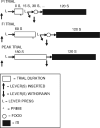




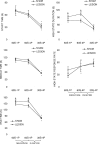
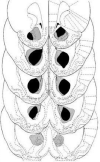

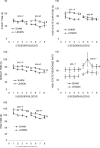
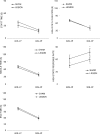
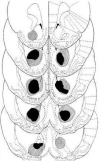


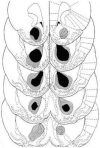
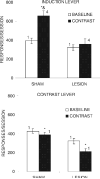
References
-
- Balleine B, Killcross S. Effects of ibotenic acid lesions of the nucleus accumbens on instrumental action. Behavioural Brain Research. 1994;65:181–193. - PubMed
-
- Barkley RA, Edwards G, Laneri M, Fletcher K, Metevia L. The efficacy of problem-solving communication training alone, behavior management training alone, and their combination for parent-adolescent conflict in teenagers with ADHD and ODD. Journal of Consulting and Clinical Psychology. 2001;69:926–941. - PubMed
-
- Belin D, Jonkman S, Dickinson A, Robbins TW, Everitt BJ. Parallel and interactive learning processes within the basal ganglia: Relevance for the understanding of addiction. Behavioural Brain Research. 2009;199:89–102. - PubMed

